Software Development, Finance and AI
We’ve been doing Software Development and Architecture work for a while at Snowpal, and currently have several B2B and B2C products in production. In this podcast, we’ll share our experiences on a regular basis to help you & your teams build great software. The topics covered in this podcast will include Product Management, Project Management, Architecture, Development, Deployment, Security, Release Management, Sales, Marketing, Advertising, and just about everything else an ambitious, fast growing startup based out of the US is likely to be involved in. So, join us. Let’s become better!
We’ve been doing Software Development and Architecture work for a while at Snowpal, and currently have several B2B and B2C products in production. In this podcast, we’ll share our experiences on a regular basis to help you & your teams build great software. The topics covered in this podcast will include Product Management, Project Management, Architecture, Development, Deployment, Security, Release Management, Sales, Marketing, Advertising, and just about everything else an ambitious, fast growing startup based out of the US is likely to be involved in. So, join us. Let’s become better!
Episodes

Friday Jan 24, 2025
Immigrating to USA
Friday Jan 24, 2025
Friday Jan 24, 2025
In this episode, Krish Palaniappan shares his personal insights on the complexities of US immigration. He emphasizes that immigration should be viewed as a privilege rather than a right, discussing the challenges and realities faced by immigrants. He encourages listeners to appreciate the opportunities available in the US while acknowledging the need for improvements in the immigration system.
The conversation highlights the importance of respect, gratitude, and understanding in the immigration process, urging a balanced perspective on the experiences of immigrants.
Takeaways
Immigration is a privilege granted by a country, not a right.
The immigration process can be lengthy and complex, often taking years.
Many immigrants contribute positively to society, even if not at the highest levels.
Comparing immigration systems globally reveals that many countries have stricter processes.
Respect and gratitude for the immigration system are essential for a harmonious society.
Life is not fair, and sometimes qualified individuals may not succeed in immigrating.
The odds of becoming a highly successful immigrant are low for most.
Good people should have a legal path to immigration, and improvements are needed.
Understanding the immigration process can help alleviate frustrations.
The journey of immigration can be painful, but patience is crucial.
Chapters
00:00 Introduction to Immigration Perspectives02:53 The Privilege of Immigration06:11 The Reality of Immigration Processes09:05 Comparative Immigration Experiences11:54 The Importance of Respect and Gratitude14:48 Conclusion and Call for Understanding
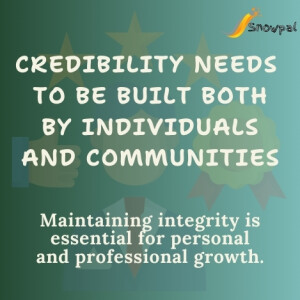
Tuesday Jan 21, 2025
Credibility needs to be built both by individuals and communities
Tuesday Jan 21, 2025
Tuesday Jan 21, 2025
In this episode, Krish Palaniappan discusses the recent layoffs at Apple, which were not due to employee performance but rather a scam involving misuse of a grant program. He reflects on the cultural implications of such news, particularly for Indian engineers, and emphasizes the importance of credibility and integrity in the tech industry. Krish shares insights on how individual actions can impact perceptions of entire communities and stresses the need for maintaining a good reputation in professional settings.
Takeaways
Layoffs in tech are often misunderstood and misreported.
Cultural identity can influence perceptions in the workplace.
Credibility is a crucial asset for engineers.
Negative news can affect the reputation of entire communities.
Maintaining integrity is essential for personal and professional growth.
The tech industry faces challenges in hiring due to credibility issues.
Good impressions are vital for future opportunities.
Honesty in professional representation is non-negotiable.
The actions of a few can impact the many in a global context.
Future discussions will return to technical topics.
Chapters
00:00 Introduction to the Podcast and Topic01:30 Layoffs at Apple: A Deeper Look04:00 Cultural Implications of the Layoffs10:11 The Importance of Credibility in Engineering15:51 Maintaining Integrity and Reputation
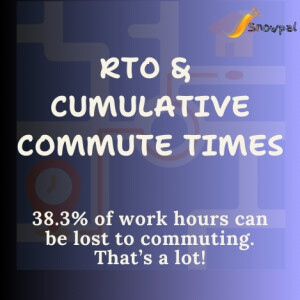
Friday Jan 17, 2025
RTO & Cumulative Commute Times
Friday Jan 17, 2025
Friday Jan 17, 2025
In this episode, Krish Palaniappan discusses the concept of “coffee badges” in the context of the return to office (RTO) debate. He explores the implications of commuting, productivity, and the quality of life for employees, particularly in the tech industry. The conversation highlights the challenges of mandatory office attendance and the potential benefits of remote work, while also considering the impact on company culture and employee satisfaction.
Takeaways
Coffee badges refer to employees who come to the office briefly.
The return to office debate raises questions about productivity.
Commuting can take up a significant amount of time.
38.3% of work hours can be lost to commuting.
Quality of life is affected by commuting time.
Companies need to consider employee satisfaction.
Remote work can lead to better work-life balance.
Different companies have different cultures and needs.
It’s important to find what works for your team.
Employee retention is linked to job satisfaction.
Chapters
00:00 Introduction to Coffee Badges01:53 The Return to Office Debate06:06 The Commute Conundrum11:56 Quantifying Commute Time17:58 Quality of Life and Work24:07 Final Thoughts and Company Culture
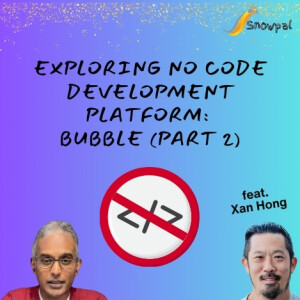
Tuesday Jan 14, 2025
(Part 2) Exploring No Code Development Platform: Bubble (feat. Xan Hong)
Tuesday Jan 14, 2025
Tuesday Jan 14, 2025
In this episode, Xan Hong, a no-code development expert, guides Krish Palaniappan through the process of building a simple to-do application using Bubble. They explore the user interface, create workflows, and discuss the transition from web-based to native app development. The conversation emphasizes practical application, collaboration, and the importance of getting a functional product up and running before focusing on aesthetics.
They explore the Bubble platform, discussing its no-code capabilities, data management, plugin integrations, and design systems. They reflect on the learning curve associated with Bubble, the potential for AI integration, and the future of no-code platforms in the context of evolving technology. The discussion highlights practical applications, user experiences, and the importance of adapting to new tools in software development.
Takeaways
• No-code development can significantly reduce costs for clients.
• Understanding the user interface is crucial for effective app development.
• Starting with a functional prototype is more important than aesthetics.
• Bubble allows for both web and native app development.
• Dynamic elements enhance user interaction in applications.
• Workflows are essential for managing data and user actions.
• Testing and debugging are critical steps in the development process.
• Collaborative development can enhance the learning experience.
• Data management is key to maintaining application functionality.
• User feedback is vital for refining app features.
• Bubble allows users to create applications without writing code.
• Understanding the platform’s structure is crucial for effective use.
• Data management in Bubble includes both data and metadata.
• Plugins enhance functionality but vary in quality.
• Design systems can be created and reused within Bubble applications.
• APIs can be integrated to extend application capabilities.
• The learning curve for Bubble can be steep for new users.
• AI integration presents new challenges for no-code platforms.
• Building meaningful projects can enhance the learning experience.
• No-code platforms are evolving with the introduction of AI technologies.
Chapters
00:00 Introduction to No Code Development02:55 Exploring Bubble's User Interface05:52 Creating a To-Do Application09:10 Understanding Native App Development with Bubble11:58 Dynamic Elements and User Interaction15:07 Workflow Creation and Data Management17:52 Testing and Debugging the Application20:47 Collaborative Development and Sharing24:01 Data Management and Deletion Functionality38:49 Navigating the Bubble Platform40:46 Understanding Data Management and Metadata42:49 Exploring Plugins and Third-Party Integrations45:35 Design Systems and Reusability in Bubble48:30 Connecting APIs and Backend Functionality53:44 Recap of Building a To-Do App55:11 Reflections on No-Code Development01:01:43 The Learning Curve of Bubble01:08:14 The Future of AI in No-Code Platforms
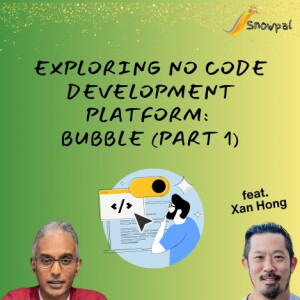
Tuesday Jan 14, 2025
(Part 1) Exploring No Code Development Platform: Bubble (feat. Xan Hong)
Tuesday Jan 14, 2025
Tuesday Jan 14, 2025
In this episode, Xan Hong shares his journey into the world of no-code development, highlighting the challenges faced by non-technical founders and the flexibility offered by platforms like Bubble. The conversation explores the evolving landscape of software development, the importance of creativity in problem-solving, and the impact of no-code solutions on traditional development roles. San emphasizes the need for adaptability in a rapidly changing technological environment and discusses the value of a well-rounded skill set in today’s market.
They delve into the intricacies of no-code platforms, particularly focusing on Bubble. They discuss backend workflows, API integration, and the advantages of no-code solutions for MVP development. The conversation also explores how no-code platforms can be utilized in various business contexts, from startups to large enterprises, and the future landscape of software development in relation to AI-generated code. Xan shares real-life case studies demonstrating the effectiveness of no-code solutions, while Krish raises thought-provoking questions about the evolving role of coding in the tech industry.
Takeaways
• No-code platforms like Bubble can save significant development costs.
• Learning data structuring is crucial for using no-code tools effectively.
• Bubble offers flexibility but has a steeper learning curve than other platforms.
• Creativity is essential in problem-solving with no-code solutions.
• Developers may feel threatened by the rise of no-code tools.
• Adaptability is key in the fast-changing tech landscape.
• A combination of business and technical skills is valuable in development.
• Clients appreciate understanding their needs during the development process.
• Problem-solving skills are more important than technical skills alone.
• No-code platforms can expose backends as APIs.
• No backend server is needed for user management.
• No-code solutions can significantly reduce development time.
• Enterprises can save millions by transitioning to no-code.
• Startups can validate ideas quickly using no-code tools.
• No-code platforms are more accessible for non-technical users.
• AI-generated code may not always be the best solution for MVPs.
• The perception of no-code limitations is often exaggerated.
• Education in tech is shifting towards practical problem-solving.
• No-code tools can complement traditional coding practices.
Chapters
00:00 Introduction to No-Code Development02:57 San's Journey into No-Code Development06:02 Challenges of Starting Without a Technical Background08:54 Exploring No-Code Platforms: Bubble vs Others11:57 The Flexibility and Limitations of No-Code Solutions14:54 Creativity in Problem Solving with No-Code17:56 The Impact of No-Code on Traditional Development21:01 Navigating the Future of Software Development23:53 The Value of a Well-Rounded Skill Set27:07 Client Perspectives on No-Code Development30:04 Hands-On with Bubble: Features and Functionality38:41 Exploring Backend Workflows and API Integration45:10 Understanding No-Code Solutions for MVP Development50:14 No-Code Platforms in Different Business Contexts54:47 The Future of No-Code vs. AI-Generated Code01:08:56 Closing Thoughts on No-Code and Personal Insights
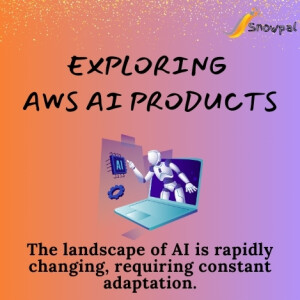
Thursday Jan 09, 2025
Exploring AWS AI Products
Thursday Jan 09, 2025
Thursday Jan 09, 2025
In this conversation, Krish Palaniappan discusses the evolving landscape of AI and software development in 2025. He emphasizes the need for adaptability in engineering roadmaps due to rapid changes in technology. The discussion highlights the importance of collaborative learning in AI, exploring AWS tools, understanding different AI models, and preparing for the future of software development. Krish encourages listeners to engage in this learning journey together, regardless of their current expertise level.
Takeaways
The landscape of AI is rapidly changing, requiring constant adaptation.
Collaborative learning is essential for effective software development.
AWS offers a vast array of tools that can be overwhelming but beneficial.
Understanding the differences between AI models is crucial for application.
Software development must evolve to incorporate new technologies and methodologies.
It's important to learn with a purpose to effectively apply knowledge.
Engaging with new tools can lead to innovative solutions.
Different career stages influence how individuals approach learning AI.
Gen Z brings fresh perspectives to software development.
Continuous learning is vital in the tech industry.
Chapters
00:00 Embracing Change in AI Development
02:50 Learning Together: The Journey of AI Exploration
06:08 Navigating AWS and AI Tools
09:02 Understanding AI Models and Their Applications
11:51 The Future of Software Development in AI
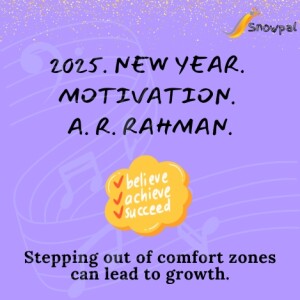
Wednesday Jan 08, 2025
2025. New Year. Motivation. A. R. Rahman.
Wednesday Jan 08, 2025
Wednesday Jan 08, 2025
In this podcast, Krish Palaniappan shares his New Year wishes and discusses the inspiration he draws from A.R. Rahman, a renowned composer. He reflects on Rahman's journey, the challenges of catering to diverse audiences in India, and the importance of motivation and commitment to one's art. The conversation also touches on the concept of Ikigai, the value of time, and the significance of finding one's calling in life. Krish emphasizes the need to step out of comfort zones and pursue passions, concluding with a hopeful message for the new year.
Takeaways
The importance of motivation in personal and professional life.
A.R. Rahman's impact on music and culture.
Catering to diverse audiences is a significant challenge.
Commitment to art is crucial for long-term success.
Finding your calling can lead to fulfillment.
The Ikigai concept helps in understanding one's purpose.
Time is a valuable resource that should be spent wisely.
Stepping out of comfort zones can lead to growth.
Chapters
00:00 New Year Wishes and Company Updates03:02 Inspiration from A.R. Rahman05:54 The Journey of A.R. Rahman08:51 Catering to Diverse Audiences12:00 Motivation and Commitment to Art14:48 Finding Your Calling18:11 The Ikigai Concept21:01 The Value of Time and Life24:13 Conclusion and Future Plans
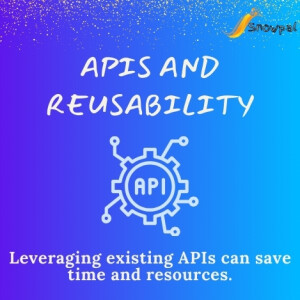
Monday Jan 06, 2025
APIs and Reusability (with charts as an example)
Monday Jan 06, 2025
Monday Jan 06, 2025
In this conversation, Krish Palaniappan discusses the significance of APIs and reusability in software development. He emphasizes how leveraging existing APIs can help organizations save time, reduce costs, and focus on core customer problems. The discussion includes examples of how APIs can enhance product offerings and the importance of not reinventing the wheel in development. Krish also highlights the various models available for utilizing APIs and the benefits they bring to businesses.
Takeaways
APIs provide essential building blocks for applications.
Reusability in development leads to faster market entry.
Organizations should focus on core competencies and customer needs.
Leveraging existing APIs can save time and resources.
Investing in reusable components enhances product quality.
APIs can be integrated quickly and efficiently.
Using APIs allows teams to avoid reinventing the wheel.
Snowpal offers a suite of APIs for various needs.
Understanding the importance of reusability is crucial for success.
APIs can help startups and mid-sized organizations thrive.
Chapters
00:00 Introduction to APIs and Reusability
04:41 The Importance of Reusability in Development
12:47 Leveraging Existing Components for Efficiency
23:13 Conclusion and Future Directions
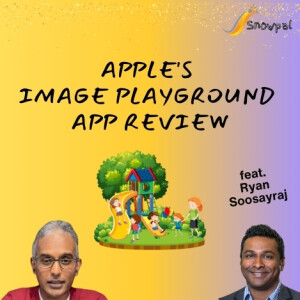
Monday Dec 16, 2024
Apple's Image Playground App Review (feat. Ryan Soosayraj)
Monday Dec 16, 2024
Monday Dec 16, 2024
In this episode of the Snowpal Polyglot Software Development Podcast, Krish Palaniappan and Ryan Soosayraj discuss the latest iOS release and its new feature, Image Playground. They explore Ryan’s background in product management, share their initial reactions to the app, and compare their experiences with other Apple products. They discuss the essence of character captured by the app, the role of AI in enhancing user experience, and Apple’s approach to integrating AI into consumer products.
They delve into the intricacies of photo selection and editing using advanced AI tools. They discuss user expectations from high-end devices, the balance between realism and creativity in AI-generated images, and the integration of image tools across various applications. They also touch on generational perspectives on image technology, the resonance of features across different demographics, and the innovations in background removal and subject copying.
Takeaways
Image Playground is designed to be playful and engaging.
Initial reactions to new technology can vary widely.
The essence of a person's character can be captured in digital form.
AI can enhance user experience in creative applications.
Apple's approach to AI focuses on user value rather than technical details.
User feedback is crucial for product development.
Features must resonate with users to be successful.
The importance of unbiased perspectives, especially from children.
Product management involves testing various features to see what sticks. Navigating photo selection can be cumbersome with large libraries.
High-end devices come with high user expectations.
AI interactions should feel intuitive and responsive.
Realism in AI images is often balanced with creative liberties.
Customization features enhance user experience in image editing.
Integration of image tools across apps is beneficial but could be deeper.
AI-generated images often present an enhanced version of the user.
Generational perspectives influence the excitement around new features.
Features that resonate across demographics can lead to widespread adoption.
Innovations in subject copying and background removal streamline editing processes. Digital avatars can reflect personal identity in unique ways.
APIs play a crucial role in enhancing creative applications.
User experience is vital for the success of new technology.
Chapters
• Image Playground is designed to be playful and engaging.
• Initial reactions to new technology can vary widely.
• The essence of a person’s character can be captured in digital form.
• AI can enhance user experience in creative applications.
• Apple’s approach to AI focuses on user value rather than technical details.
• User feedback is crucial for product development.
• Features must resonate with users to be successful.
• The importance of unbiased perspectives, especially from children.
• Product management involves testing various features to see what sticks.
• Navigating photo selection can be cumbersome with large libraries.
• High-end devices come with high user expectations.
• AI interactions should feel intuitive and responsive.
• Realism in AI images is often balanced with creative liberties.
• Customization features enhance user experience in image editing.
• Integration of image tools across apps is beneficial but could be deeper.
• AI-generated images often present an enhanced version of the user.
• Generational perspectives influence the excitement around new features.
• Features that resonate across demographics can lead to widespread adoption.
• Innovations in subject copying and background removal streamline editing processes.
• Digital avatars can reflect personal identity in unique ways.
• APIs play a crucial role in enhancing creative applications.
• User experience is vital for the success of new technology.
• Face recognition technology is evolving and becoming more integrated into daily life.
• Cultural connections through food can deepen personal relationships.
• Unexpected conversations can lead to meaningful connections.
• The importance of sharing experiences with family across generations.
• Technology can be both playful and functional in our lives.
• Food is an emotional experience that connects us to our heritage.
• Serendipity often leads to the most rewarding interactions.

Thursday Dec 12, 2024
Creating AD Campaigns on Meta Platforms (feat. Dan Nikas)
Thursday Dec 12, 2024
Thursday Dec 12, 2024
In this episode, Krish Palaniappan interviews Dan Nikas, a former homicide detective turned e-commerce expert. Dan shares his journey from policing to founding Gear Bunch and becoming a leading figure in email marketing and Meta advertising. The conversation delves into the challenges of B2C marketing, the importance of understanding audience needs, and effective strategies for creating successful marketing campaigns on Meta platforms. Dan emphasizes the significance of data-driven decision-making and the evolving landscape of digital marketing, particularly the necessity of multiple touchpoints to convert potential customers.
Dan and Krish discuss effective advertising strategies for startups, emphasizing the importance of creating engaging ads without a large budget or a dedicated creative team. They explore the necessity of marketing in business, especially in a privacy-conscious world, and the significance of cultural sensitivity in global advertising. The discussion highlights the value of taking imperfect action and learning from experiences, as well as the essential role of marketing in ensuring that unique products reach their intended audience.
Takeaways
Dan transitioned from a 17-year career in policing to e-commerce.
Understanding audience needs is crucial for effective marketing.
Marketing is about selling solutions, not just products.
Meta’s algorithm can help target the right audience effectively.
Creating custom audiences can be done at a low cost.
The rule of seven touchpoints has evolved to 19-21 touchpoints.
Brand awareness campaigns can help filter potential customers.
Data-driven marketing is essential for optimizing campaigns.
Geographic targeting should be based on product relevance.
Engagement metrics are key to refining marketing strategies.
You can effectively advertise on a small budget.
It’s crucial to answer potential customer questions through ads.
Imperfect action is better than inaction; don’t wait for perfection.
Cultural differences matter in advertising; tailor your message accordingly.
Investing in advertising helps you learn and optimize faster.
Even unique products need marketing to gain visibility.
Use available tools like Canva to create ads without a creative team.
Engaging content can come from everyday experiences and insights.
Building trust and relationships is key in marketing.
Marketing is a collective responsibility across all roles in a company.
Chapters
00:00 Introduction to Dan Nikas and His Journey03:40 Transitioning from Policing to E-commerce04:37 Understanding Email Marketing and Meta Advertising07:10 Challenges in B2C Marketing10:14 Targeting the Right Audience on Meta Platforms12:45 Creating Effective Campaigns for B2C Products19:19 Data-Driven Audience Creation22:39 Geographic Targeting Strategies26:44 Leveraging Meta's Algorithm for Audience Engagement30:11 The Importance of Touchpoints in Marketing39:19 Effective Advertising Strategies for Startups43:31 Creating Engaging Ads Without a Creative Team52:38 The Importance of Imperfect Action in Marketing55:30 Navigating Advertising in a Privacy-Conscious World01:01:25 Understanding the Role of Marketing in Business Success01:06:11 Cultural Sensitivity in Global Advertising01:07:15 The Necessity of Marketing for Unique Products







